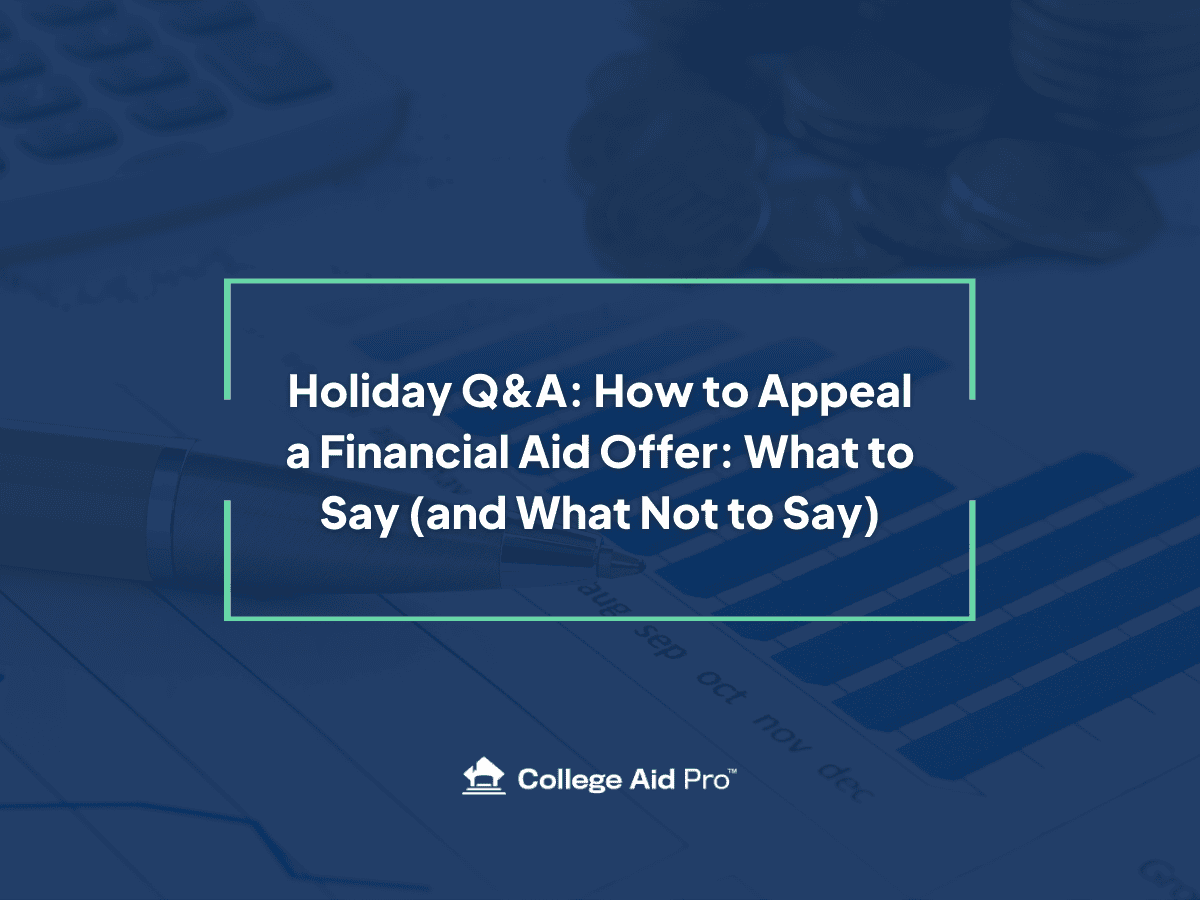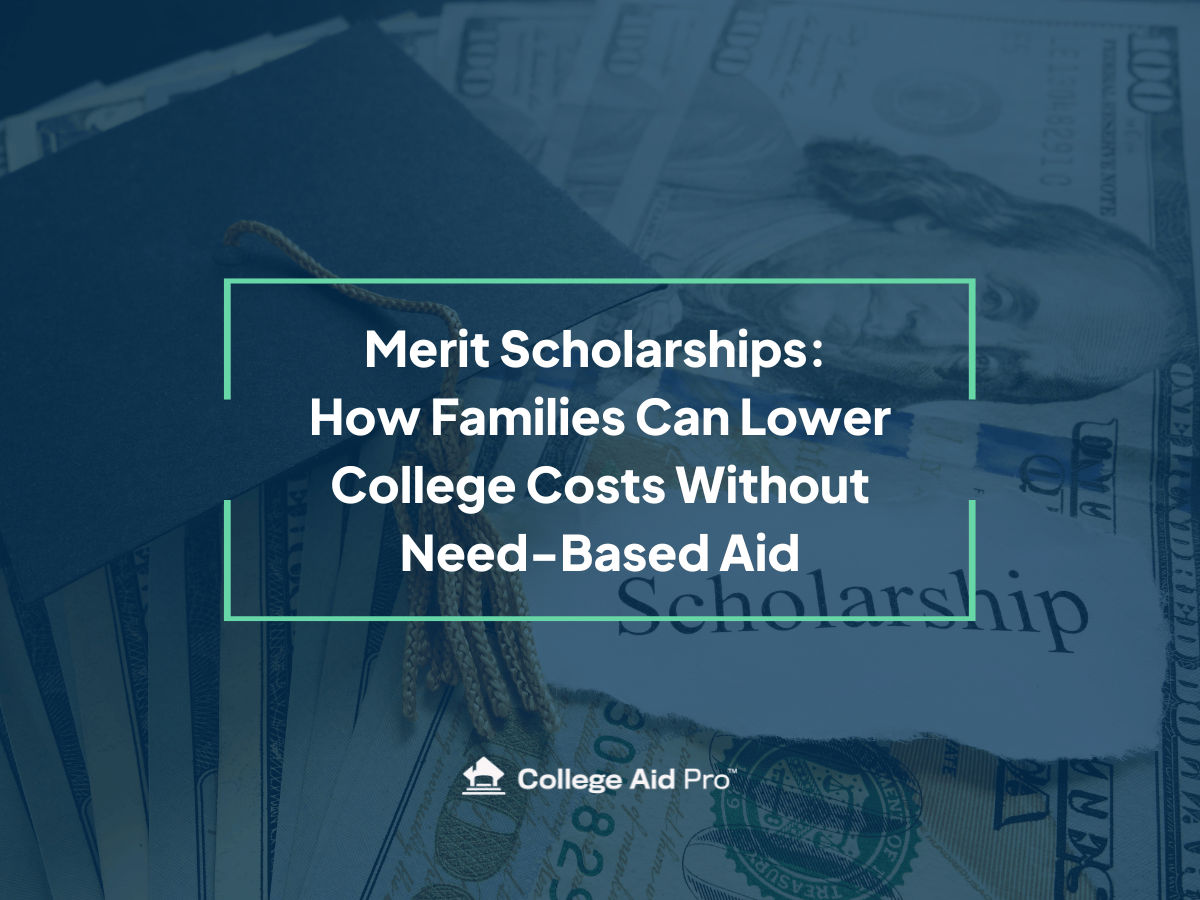Wait, I Can Ask A College To Give Me More Money?
At some point during the college process, you’ll probably come across the term “financial aid appeal.” In plain terms, a financial aid appeal means you’re asking the college to give you more free money (grants or scholarships,) so you can reduce what you pay out of pocket or what your student takes out in loans. It sounds a bit formal, maybe even intimidating, but don’t let the phrase throw you. Appealing a college’s financial aid offer is not only possible, it can be a smart, strategic move that saves your family serious money.
Let’s break it down, parent-to-parent.
First Comes the Offer Letter
Once your student gets into a college, the next big piece of the puzzle is the financial aid award letter. This comes from the school’s financial aid office and lays out the kinds of aid your child is being offered:
- Need-based aid (based on your family’s financial circumstances)
- Merit-based scholarships (for things like GPA, test scores, or talents)
- Federal student loans
- Work-study opportunities
That letter will show the total cost after aid, essentially, what you’re expected to pay. If your student got accepted to multiple schools, you’ll get a financial aid award letter from each of the schools, and you can start to compare each of the offers. This is where things start getting interesting.
Quick note: Most families expect to see a financial aid package shortly after an admission offer, but sadly that’s not how the process works. Even if your student applies early action or through rolling admissions and hears back from schools in the fall, the official financial aid award letters typically don’t arrive until February or March. That’s because colleges rely on federal and institutional data (like FAFSA and CSS Profile information) to finalize their offers, and those systems don’t always move quickly.
What It Means to Appeal
You can’t appeal a financial aid offer until you actually have one in hand. Once that award letter arrives—usually in the spring—it’s your green light to start the conversation.
That letter includes what the college will cost for the first year and how they propose to help cover it. You’ll typically see grants, scholarships, federal student loans, work-study eligibility, and your Student Aid Index (SAI). It’s essentially a financial snapshot—and it’s also where your opportunity to appeal begins.
A financial aid appeal is your chance to go back to the college and say, “Thanks for the offer – but here’s why we hope you’ll consider giving us more support.”
You can appeal for:
- More need-based aid (maybe your financial situation changed since filing the FAFSA)
- Increased merit-based aid (maybe your student received a better offer elsewhere, or improved their grades or test scores)
Think of it less like haggling and more like opening a conversation. It’s NOT a used car negotiation it’s a respectful request, and most colleges are willing to listen.
When It’s Worth Trying
We’ve seen lots of successful appeals, especially when:
- Your family’s finances have changed. A job loss, unexpected medical bills, retirement – any of these can justify a new look at your aid eligibility.
- You got a better offer from a similar school. It’s fair to ask your preferred college if they can come closer to another package.
- You have new info to share. Maybe new awards, higher test scores, or updated academic records.
Also, private colleges usually have more wiggle room than public schools when it comes to adjusting aid. That doesn’t mean you can’t try with a public school, but your odds are typically better with private institutions.
Do It the Right Way
This part’s important: the tone you take matters.
You don’t want to sound like you’re demanding a better deal. Colleges are far more receptive when you approach them thoughtfully. Acknowledge their original offer, explain your situation clearly, and make a respectful case for reconsideration.
Most schools have a process in place for this. Some have forms, others prefer a letter or email. Don’t be afraid to ask what they need from you.
Don’t Miss Out Just Because You Didn’t Know
Plenty of families never appeal because they didn’t realize they could, or they felt weird about asking. Totally understandable, but it could also be a missed opportunity.
We’ve seen families leave thousands of dollars on the table just because they didn’t start this conversation. Even if your package seems fair, it doesn’t hurt to explore the possibility that it could be better.
Use MyCAP to Help
Appealing isn’t guesswork – at least, it doesn’t have to be.
With our college planning tool MyCAP, you can create a free account to estimate what your aid award should look like. Once you receive real offers from colleges, upload them into your MyCAP dashboard. Our software translates the offer and tells you if you got the best offer possible. If you didn’t it will give you reasons you should consider an appeal.
It’s like having a financial aid expert in your pocket (minus the awkward phone calls).
Final Thoughts: It’s About Advocating for Your Family
Every student’s situation is different. When my kids applied to college, I didn’t appeal every offer, but I did appeal some, based on where it made sense. One school might be more flexible, another might have deeper resources, or one might just need a nudge to improve their package.
The bottom line? You’ve got nothing to lose by asking, and potentially a lot to gain.
So if your student has those award letters in hand—or they will soon—just know you don’t have to accept the first offer at face value. A simple appeal might make college significantly more affordable.
And hey, happy planning. You’ve got this.



